Givaudan Bundle
Who Really Owns Givaudan?
Understanding the Givaudan SWOT Analysis is crucial, but have you ever wondered about the very foundation of this flavor and fragrance giant? The question of "Who owns Givaudan?" goes beyond simple stock tickers; it delves into the heart of its strategic decisions and future direction. From its roots in 1895 to its current status as an industry leader, Givaudan's ownership has undergone a fascinating transformation.
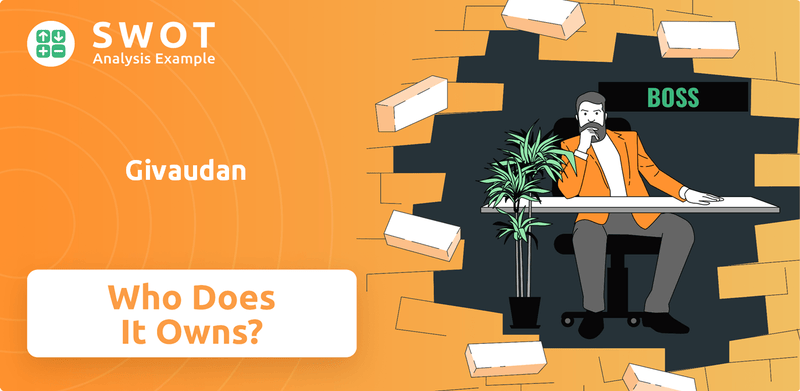
This exploration into Givaudan ownership will uncover the key players shaping its destiny. We'll examine the evolution of Givaudan's shareholders, from the founding family to the major institutional investors who hold significant sway today. Discover how the Givaudan company's ownership structure impacts its governance, financial performance, and overall strategic trajectory, providing valuable insights for investors and industry observers alike.
Who Founded Givaudan?
The story of Givaudan company begins in 1895, in Lyon, France, with brothers Léon and Xavier Givaudan. They started the company with a focus on perfumery. This marked the inception of what would become a global leader in the fragrance and flavor industry.
In 1898, the company moved to Geneva, Switzerland, and set up a factory in Vernier. While the exact initial ownership details of the founders aren't publicly available, their vision and early efforts were crucial. They laid the groundwork for the company's future, focusing on innovation in perfume chemistry.
The early years of Givaudan were all about pioneering the creation and analysis of fragrances. This dedication to innovation shaped the company's direction and set it apart in the industry.
In 1963, Givaudan ownership changed significantly when Roche, a pharmaceutical company, acquired it. This move shifted the company from private to part of a larger corporate structure.
Roche expanded its presence in the fragrance sector by acquiring Roure in 1964. This acquisition was later merged with Givaudan, forming Givaudan-Roure.
Under Roche's ownership, Givaudan broadened its capabilities to include the flavor industry. This expansion was supported by earlier acquisitions like Ersolko SA in 1948.
The initial focus of the company was on the analysis, synthesis, and production of fragrances. This early focus showcases the founders' commitment to innovation.
The founders' vision for innovation in perfume chemistry was a key driver in the company's early success. This vision guided the company's early direction.
The early ownership structure, though not fully detailed, was centered around the founders. Their efforts were fundamental to the company's initial growth.
The acquisition by Roche in 1963 marked a pivotal moment in the Givaudan history, transforming its Givaudan ownership structure and expanding its market reach. This strategic move, alongside the subsequent acquisition and integration of Roure, significantly shaped Givaudan into a major player in the fragrance and flavor industries. For more details on the company's journey, you can read a Brief History of Givaudan.
Givaudan SWOT Analysis
- Complete SWOT Breakdown
- Fully Customizable
- Editable in Excel & Word
- Professional Formatting
- Investor-Ready Format
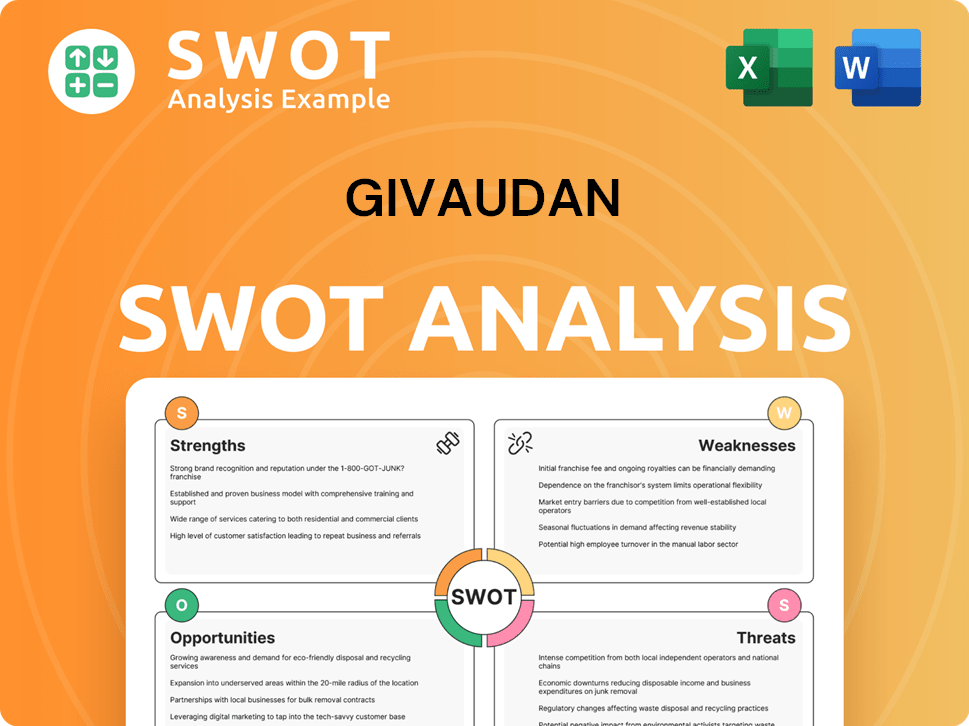
How Has Givaudan’s Ownership Changed Over Time?
The most significant shift in the Givaudan ownership structure occurred in June 2000, when it spun off from Roche and became an independent entity. This initial public offering (IPO) marked a pivotal moment, transforming the company into a publicly traded firm listed on the Swiss Stock Exchange (SIX: GIVN). Since its IPO, the company has seen substantial growth. As of May 23, 2025, its market capitalization reached approximately USD 46.01 billion, reflecting a remarkable increase of 12,527.29% since its IPO.
The Givaudan company ownership has evolved significantly since its IPO. As of December 31, 2024, the company had around 42,185 registered shareholders, collectively holding 53% of the company's capital. Institutional investors play a crucial role in the ownership structure of Givaudan. As of May 30, 2025, 333 institutional owners and shareholders held a total of 815,856 shares. Key institutional investors include Vanguard Total International Stock Index Fund Investor Shares (VGTSX), Vanguard Developed Markets Index Fund Admiral Shares (VTMGX), iShares Core MSCI EAFE ETF (IEFA), and iShares MSCI EAFE ETF (EFA).
| Date | Event | Impact on Ownership |
|---|---|---|
| June 2000 | Spin-off from Roche; IPO on SIX | Became a publicly traded company. |
| 2002 | Nestlé acquired a 10% stake | Increased institutional ownership. |
| December 31, 2024 | Shareholder Updates | William H. Gates III (Cascade Investment, L.L.C.) held 12.03%, BlackRock Inc. held 5.06%, and Haldor Foundation held 4.96%. |
The ownership structure of Givaudan is diverse, with a significant portion held by institutional investors. As of June 10, 2025, notable institutional holders of Givaudan SA - Depositary Receipt (Common Stock) (US:GVDNY) include ActivePassive International Equity ETF (APIE), Albert D Mason Inc, and Rhumbline Advisers. These shifts highlight the dynamic nature of Givaudan shareholders and the influence of major investors. For more insights into the competitive landscape, consider exploring the Competitors Landscape of Givaudan.
Givaudan's ownership structure has evolved significantly since its IPO in 2000, becoming a publicly traded company.
- Institutional investors hold a substantial portion of the shares.
- Key shareholders include major investment firms and individual investors.
- The company's market capitalization has grown significantly since its IPO, reflecting strong performance.
- Understanding the ownership structure is crucial for investors and stakeholders.
Givaudan PESTLE Analysis
- Covers All 6 PESTLE Categories
- No Research Needed – Save Hours of Work
- Built by Experts, Trusted by Consultants
- Instant Download, Ready to Use
- 100% Editable, Fully Customizable
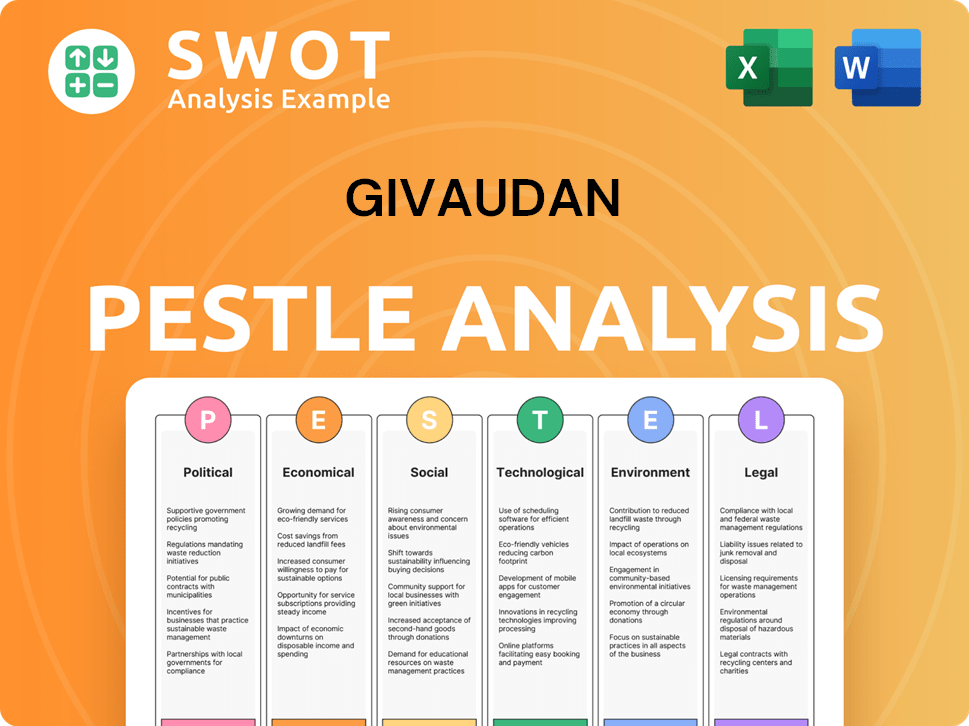
Who Sits on Givaudan’s Board?
The current Board of Directors of Givaudan, responsible for the strategic oversight and control of the company, is elected annually. As of the Annual General Meeting (AGM) on March 20, 2025, all Board members serve a one-year term. The Board comprises between seven and nine members. At the 2025 AGM, Melanie Maas-Brunner and Louie D'Amico were newly elected to the Board. Olivier Filliol retired from the Board after the 2025 AGM. The remaining six Board members, including Calvin Grieder as Chairman, were re-elected.
Understanding the Givaudan ownership structure is key to assessing its governance. The company's voting structure is based on one-share-one-vote, with only one class of registered shares, each with a par value of CHF 10.00, granting equal rights and one vote per share. There are no dual-class shares or special voting rights. The acquisition of shares through options or conversion rights is subject to restrictions outlined in the company's Articles of Incorporation.
| Board Member | Role | Date of Election/Re-election (2025 AGM) |
|---|---|---|
| Calvin Grieder | Chairman | Re-elected |
| Melanie Maas-Brunner | Board Member | Elected |
| Louie D'Amico | Board Member | Elected |
| Remaining 6 Board Members | Board Members | Re-elected |
At the 2025 AGM, Givaudan shareholders representing 60.39% of the total 9,233,586 registered shares were present. Key approvals included the 2024 management report, annual financial statements, and consolidated financial statements with 99.71% of votes, and the 2024 Report on non-financial matters with 97.85% of votes. The compensation report for 2024 was approved on a consultative basis with 88.79% of votes. The maximum aggregate compensation for the Board of Directors for the term until the 2026 AGM was approved at CHF 3,000,000 with 98.08% of votes, and the maximum aggregate fixed and long-term variable compensation for the Executive Committee for fiscal year 2025 was approved at CHF 16,500,000 with 92.93% of votes. To further understand the financial aspects of the company, you can explore Revenue Streams & Business Model of Givaudan.
The Board of Directors oversees Givaudan's strategic direction, with members elected annually.
- The voting structure is straightforward: one share, one vote.
- Shareholders actively participate in key decisions, as seen in the high voter turnout at the 2025 AGM.
- Compensation for both the Board and the Executive Committee is subject to shareholder approval.
Givaudan Business Model Canvas
- Complete 9-Block Business Model Canvas
- Effortlessly Communicate Your Business Strategy
- Investor-Ready BMC Format
- 100% Editable and Customizable
- Clear and Structured Layout
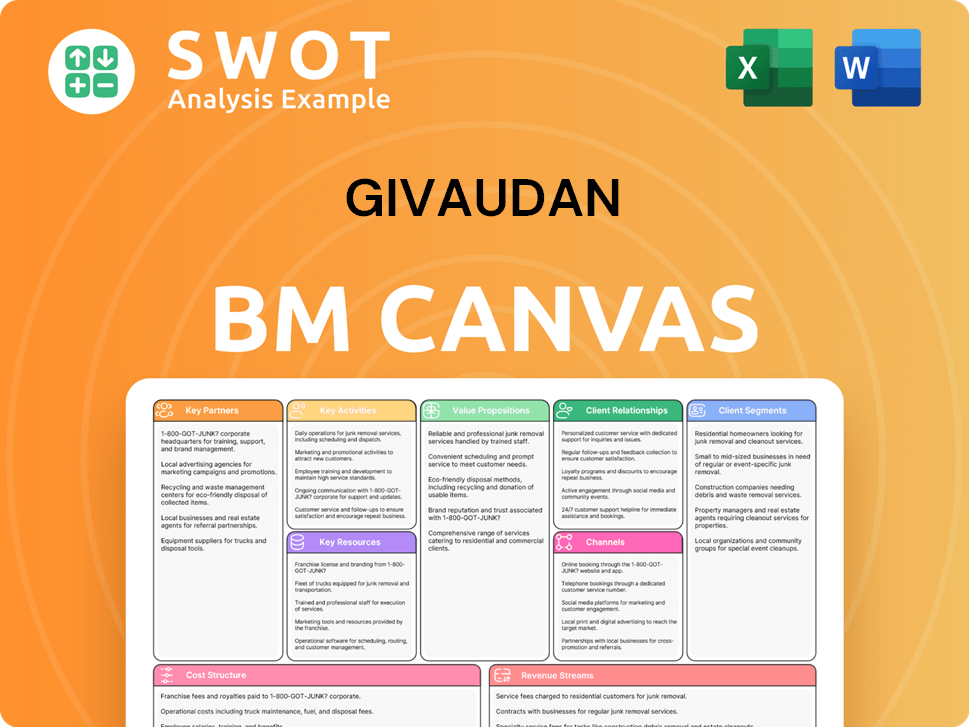
What Recent Changes Have Shaped Givaudan’s Ownership Landscape?
Over the past few years, the ownership structure of the Givaudan company has remained relatively stable, with no major shifts in controlling shareholders. The company has, however, actively pursued strategic acquisitions to bolster its market position. For instance, in July 2024, Givaudan increased its stake in B. Kolormakeup & Skincare, acquiring the remaining 75% after an initial 25% in 2021. This move aligns with Givaudan's growth strategy for the beauty sector.
Givaudan's acquisition strategy also includes the full acquisition of Alderys SAS in 2024, purchasing the remaining 20% of shares. The company's spending on acquisitions was approximately CHF 180 million in 2023, with expectations for increased M&A activity in the coming years. These actions reflect Givaudan's commitment to expanding its portfolio and maintaining its leadership in the flavors and fragrances industry. The company has also been leveraging new technologies, such as its e-commerce solution Givaudanperfume.id, to serve local and fragmented markets.
| Metric | 2024 | 2023 |
|---|---|---|
| Sales (CHF million) | 7,412 | N/A |
| Net Income (CHF million) | 1,090 | N/A |
| Dividend per share (CHF) | 70.00 | N/A |
Givaudan's financial performance in 2024 was robust, with record profit and significant sales growth. Full-year sales reached CHF 7,412 million, a 12.3% increase on a like-for-like basis. Net income was CHF 1,090 million in 2024, a 22.1% increase from 2023. The company is on track to exceed its 2025 sales growth target. For insights into the company's target market, you can explore the Target Market of Givaudan.
Givaudan has been actively acquiring companies to expand its presence in key markets. These acquisitions include full ownership of B. Kolormakeup & Skincare and Alderys SAS.
The company reported strong financial results in 2024, with significant sales and net income growth. Givaudan's sales reached CHF 7,412 million, and net income was CHF 1,090 million.
Antoine Khalil will become President Taste & Wellbeing, effective April 1, 2025. Louie D'Amico retired from the Executive Committee but was elected to the Board of Directors effective October 1, 2025.
Givaudan has a consistent dividend policy, proposing a cash dividend of CHF 70.00 per share for 2024. This marks the 24th consecutive increase since its 2000 listing.
Givaudan Porter's Five Forces Analysis
- Covers All 5 Competitive Forces in Detail
- Structured for Consultants, Students, and Founders
- 100% Editable in Microsoft Word & Excel
- Instant Digital Download – Use Immediately
- Compatible with Mac & PC – Fully Unlocked
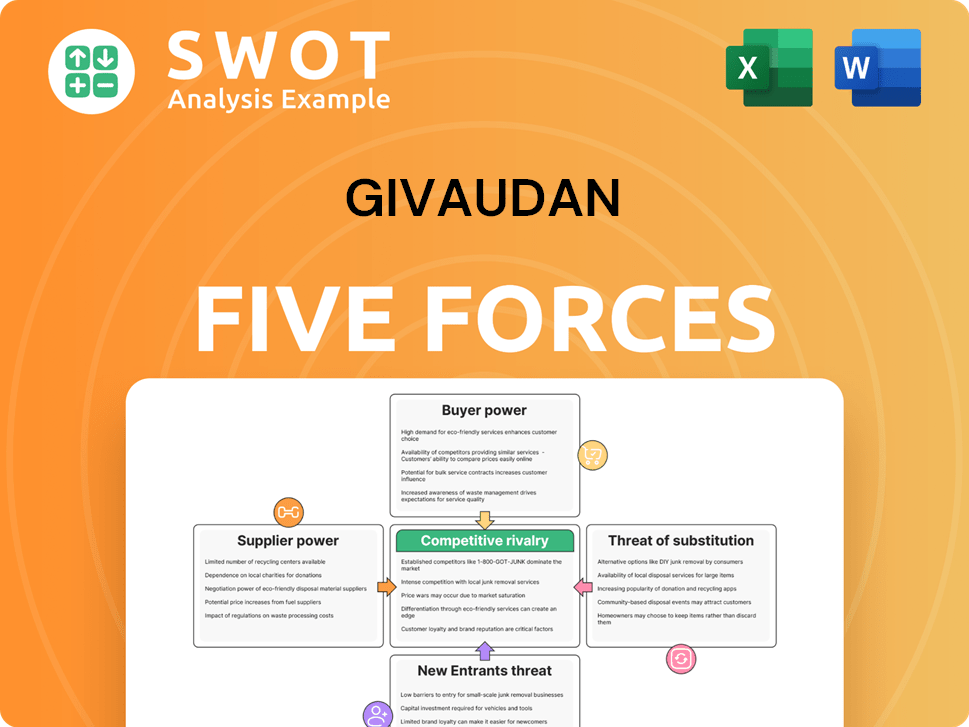
Related Blogs
- What are Mission Vision & Core Values of Givaudan Company?
- What is Competitive Landscape of Givaudan Company?
- What is Growth Strategy and Future Prospects of Givaudan Company?
- How Does Givaudan Company Work?
- What is Sales and Marketing Strategy of Givaudan Company?
- What is Brief History of Givaudan Company?
- What is Customer Demographics and Target Market of Givaudan Company?
Disclaimer
All information, articles, and product details provided on this website are for general informational and educational purposes only. We do not claim any ownership over, nor do we intend to infringe upon, any trademarks, copyrights, logos, brand names, or other intellectual property mentioned or depicted on this site. Such intellectual property remains the property of its respective owners, and any references here are made solely for identification or informational purposes, without implying any affiliation, endorsement, or partnership.
We make no representations or warranties, express or implied, regarding the accuracy, completeness, or suitability of any content or products presented. Nothing on this website should be construed as legal, tax, investment, financial, medical, or other professional advice. In addition, no part of this site—including articles or product references—constitutes a solicitation, recommendation, endorsement, advertisement, or offer to buy or sell any securities, franchises, or other financial instruments, particularly in jurisdictions where such activity would be unlawful.
All content is of a general nature and may not address the specific circumstances of any individual or entity. It is not a substitute for professional advice or services. Any actions you take based on the information provided here are strictly at your own risk. You accept full responsibility for any decisions or outcomes arising from your use of this website and agree to release us from any liability in connection with your use of, or reliance upon, the content or products found herein.